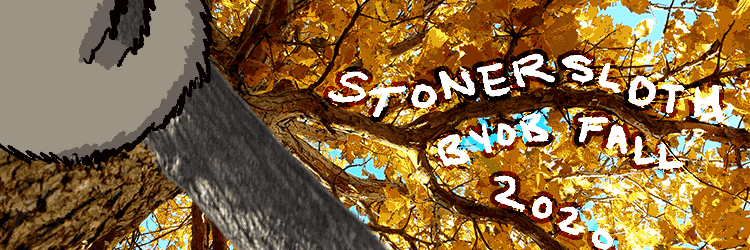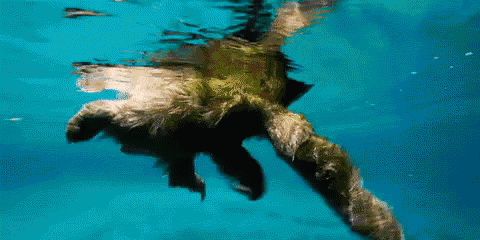|
|
Stoner Sloth posted:good points - also makes me wonder about some of the chemoautotrophic bacteria or archaea that live on deep sea vents or deep underground or bacteria that 'breathes' uranium or iron that gets all they need from rock - what strange time does a thing that lives entirely separate from the cycle of the sun keep? You mean shift workers? |
|
|
|

|
| # ? Apr 20, 2024 04:07 |
|
|
fascinating! however (and I realize you probably trimmed a lot because there's so much to say), awareness of the passage of time, circadian rhythms, etc. isn't quite the same as having awareness of "the future" as a generalized concept. there are plenty of behaviors that only make sense in the context of anticipation (e.g. squirrels stashing nuts, which is likely instinctive), but do nonhumans have the ability to parse things like deferral when it's not part of an already-understood pattern like food gathering, mating, and whatnot? I mean, I guess animals that can construct and execute plans probably have a fairly advanced conception of the future, but I imagine this is rather uncommon. what about other species?
|
|
|
Manifisto posted:do nonhumans have the ability to parse things like deferral when it's not part of an already-understood pattern like food gathering, mating, and whatnot? are you sure humans can?
|
|
|
|
|
|
what about birds that take weeks to build a nest?
|
|
|
|
|
Finger Prince posted:You mean shift workers? lmbo
|
|
|
| The absence of bwee from this thread is physically painful to me | |
|
|
|
|
nut posted:what about birds that take weeks to build a nest? I get the sense that there are lots of instinctive behaviors that seem quite sophisticated, but it's really just the animal going through a set of motions determined by evolution rather than conscious intent. douglas hofstadter talked about something he called "sphexishness" after a seemingly intelligent behavior by digger wasps. quote:When such a wasp returns to its burrow with a paralysed cricket to feed its grubs, it will leave it at the entrance while it checks inside that all is well. It then comes out again and drags its prey inside. This gave a naturalist with a cruel streak an idea for a bit of behavioural research. He moved the cricket a little way away while the wasp was in its burrow. When it surfaced and found its cricket was missing, it searched for it and returned it to the entrance to its burrow. It then repeated its search of the inside. No matter how many times the cricket was moved, the wasp repeated the same steps robotically without working out what was going on. you don't need an awareness of the future per se to follow a set of complicated steps if you're relying on instinct. cda posted:The absence of bwee from this thread is physically painful to me paging bwee
|
|
|
owlhawk911 posted:are you sure humans can? seriously do you think humans have an understanding of these temporal concepts free from context? because i don't, we're just another critter. you ain't special ya drat dirty apes
|
|
|
|
|
|
Manifisto posted:I get the sense that there are lots of instinctive behaviors that seem quite sophisticated, but it's really just the animal going through a set of motions determined by evolution rather than conscious intent. douglas hofstadter talked about something he called "sphexishness" after a seemingly intelligent behavior by digger wasps. there's growing work showing that when u ask humans how they'd navigate a new town, they give you logical explanations that sound smart and planned but when they do VR or real world experiments they show people do all sorts of weird ape poo poo stuff that doesn't align with either what they thought beforehand or sometimes how they even interpret their actions afterwards. I maintain that humans still tend to ascribe a lot more value and complexity to their actions then might actually be there
|
|
|
|
|
owlhawk911 posted:seriously do you think humans have an understanding of these temporal concepts free from context? because i don't, we're just another critter. you ain't special ya drat dirty apes all aanimals know is chill
|
|
|
|
|
owlhawk911 posted:seriously do you think humans have an understanding of these temporal concepts free from context? because i don't, we're just another critter. you ain't special ya drat dirty apes to be fair "understanding" itself is kind of vague. what qualifies as "understanding" something? scientists seem to ask stuff like "can I make predictions with it," so really a functional definition of knowing the future is probably sensible. which is to say, it's sort of silly to talk about understanding the future "free from context." I would maybe say, do we have a conception of the future that can be applied flexibly and usefully across a large number of contexts, including things that could not easily be anticipated and/or do not come up in natural day to day existence? human intelligence is ridiculously adaptable, think of how easy it is for us to adapt to the "internal logic" of arbitrary games, stories, and whatnot. a story in which time goes in reverse is something we can mentally handle without too much difficulty, I've seen various takes on this concept. I would call that a pretty useful and flexible understanding of "the future" if we can comfortably reconcile a tension between narrative future and chronological future.
|
|
|
|
|
nut posted:there's growing work showing that when u ask humans how they'd navigate a new town, they give you logical explanations that sound smart and planned but when they do VR or real world experiments they show people do all sorts of weird ape poo poo stuff that doesn't align with either what they thought beforehand or sometimes how they even interpret their actions afterwards. I maintain that humans still tend to ascribe a lot more value and complexity to their actions then might actually be there okay, I've seen plenty of references to the notion that our constructed conscious narratives about why we do what we do are often, well, just-so stories applied in retrospect. but that doesn't mean there aren't all sorts of fascinating and complicated things going on in the moment, they just aren't what we think of as rational cognition. and I have to think there are certain types of activity that can't really occur without actual legitimate conscious rational thinking. say, designing and building a passenger jet that actually flies, especially for the first time. not only is that insanely complicated, it is far too complicated for one person to do alone, so the entire project has to be managed in a way that different people can communicate usefully with one another about it. rationality is one way we propagate complex ideas from one mind to another.
|
|
|
|
|
Manifisto posted:to be fair "understanding" itself is kind of vague. what qualifies as "understanding" something? scientists seem to ask stuff like "can I make predictions with it," so really a functional definition of knowing the future is probably sensible. I actually disagree with this being the limit of what science currently views as understanding. there is a lot of work in cognitive evolution that (incorrectly, in my opinion) views the concept of "insight" as a crowning achievement of any species capable of it. It is defined as an animal viewing a problem, mentally solving it, and then acting to solve it correctly on its first try. As you can imagine, a huge flaw in this approach is that its easy to test in humans because you can ask them what they were thinking and they can tell you In animals, however, it looks something like this: A crow cuts a tool out of a leaf correctly the first time, we love crows and think they are very smart for some reason so we assume this is insight because it didn't have to fiddle around learn anything, it just figured it out instantly. And the issue with this is when we look at less popular behaviours: some species of bird will also build a nest correctly the first time, showing no fiddling or flexibility in the behaviour, but their actions are assumed to be instinctual, contrasted with insight as one of the most simple forms of cognition And of course neither species can tell us what is was thinking, which is greedily held by people who research humans as the make-or-break requirement for this specific type of cognition. A similar problem is seen when studying episodic memories, where researchers now have to prove that an animal "mentally time travels" back to the time the memory was made. Something impossible in non-humans and easy in humans. If you don't study humans, you can prove an animal can learn a task (a what), with a location (a where), and a time (a when), but they typically have to call it what-where-when memory because episodic requires proof of mental time travel (which requires self-report).
|
|
|
|
|
Manifisto posted:and I have to think there are certain types of activity that can't really occur without actual legitimate conscious rational thinking. say, designing and building a passenger jet that actually flies, especially for the first time. not only is that insanely complicated, it is far too complicated for one person to do alone, so the entire project has to be managed in a way that different people can communicate usefully with one another about it. rationality is one way we propagate complex ideas from one mind to another. is it too far of me to then compare this to eusocial animals living in collective hives with caste systems where the whole thing only works because individuals do their jobs, yet there is no obvious manager. It is completely fair for a lot of reasons to say yes hahaha
|
|
|
|
|
nut posted:is it too far of me to then compare this to eusocial animals living in collective hives with caste systems where the whole thing only works because individuals do their jobs, yet there is no obvious manager. It is completely fair for a lot of reasons to say yes hahaha natural selection and instinct can account for very complicated social behaviors, but especially when you're talking about a single generation it doesn't seem to have anything approaching the flexibility of human thought. how well could a hive adapt to getting nutrition from something totally unlike its traditional diet? it wouldn't be just about communicating "now you eat this instead of that," it would also totally change things like honey production and storage, child rearing, foraging strategies, and whantot. over time, sure, hives that stumble upon the right way to do things by trial and error will be selected for, but could a hive map out a strategy like: "okay, we're going to split into teams and try five different foraging methods and adopt the one with the highest yield"? but if you're going to go that route, maybe it would be fairer to compare an individual human to a hive rather than a single organism. the hive is a system with connectivity and whatnot and it may be much more sensible to talk about "the hive" doing something, rather than an ant or wasp or whatever. not an insight novel to hofstadter, but something he played with.
|
|
|
nut posted:is it too far of me to then compare this to eusocial animals living in collective hives with caste systems where the whole thing only works because individuals do their jobs, yet there is no obvious manager. It is completely fair for a lot of reasons to say yes hahaha i don't think so and also bees are imo the smartest critters. gently caress our metrics that haplodiploid genetics poo poo is cray-cray. they have a fundamental understanding of what they are and how they are created that we lack entirely. we're all "hurr durr crispr maybe?" and they're like "oh it's getting colder than it was last year better make hairier babies. we got a mite problem better make the next batch more hygenic." literally collecting and splicing dna to fit a purpose, and doing that without tools just makes it *more* impressive to me anyone who thinks humans are the most advanced species on earth hasn't done nearly enough psychedelics
|
|
|
|
|
|
Super happy that you guys get engaged here, please feel free to share your thoughts on this!! I'll comment later when I'm off work, in the meantime I'll do a shameless plug for my ant crew post about eusocial minds here, as that's a particularly magical area and in the general question of how eusocial hive minds work.
|
|
|
Manifisto posted:natural selection and instinct can account for very complicated social behaviors, but especially when you're talking about a single generation it doesn't seem to have anything approaching the flexibility of human thought. how well could a hive adapt to getting nutrition from something totally unlike its traditional diet? it wouldn't be just about communicating "now you eat this instead of that," it would also totally change things like honey production and storage, child rearing, foraging strategies, and whantot. over time, sure, hives that stumble upon the right way to do things by trial and error will be selected for, but could a hive map out a strategy like: "okay, we're going to split into teams and try five different foraging methods and adopt the one with the highest yield"? yeah hive=person is more equivalent imo, most of the drones are engineered clones like i was sayin in that last post. bees are way more adaptable than you're giving them credit for, they do adapt super well to changes in their food supply to a pretty wide extent. still gotta be a plant with nectar but lavender/orchids is a pretty big change and nbd for them. they adapt not only foraging strategies and food storage cycles but their freakin genetic makeup. also a lot of people would poo poo themselves and die without fast food/grocery stores, and i would be super impressed by a community that went "okay, we're going to split into teams and try five different foraging methods and adopt the one with the highest yield" and actually carried it out. big bee fan here. paging beekeeper bro h. papps to this thread to school ya
|
|
|
|
|
|
nut posted:I actually disagree with this being the limit of what science currently views as understanding. I don't think you're being intentionally straw-manny but that's nothing like what I said. I referred to "understanding" being a slippery concept and suggested we pick a functional definition for convenience (and I don't think it's unfair to say that scientists do this all the time, relatively few scientists worry about the "ontology" of the wave-particle duality, they're happy to have a highly precise and useful mathematical model). undoubtedly, in this case, not even the best functional definition, we're just shooting the breeze fer heck's sake. but I'll stick with my proposal simply for sake of discussion, which is to focus on adaptability to new contexts. I know I am harping on hofstadter but I thought he did a really excellent job, across his body of work, in highlighting just how flexible and generalist human mental abilities are. I agree, when you can't ask an animal what it's thinking you can't say much about how much insight, planning, inentionality, and whatnot went into a given behavior. but if you can test the behavior over a lot of radically different contexts, including ones the animal couldn't possibly have seen before, I think you can get useful insight into whether it's instinctual. I guess my assumption, and feel free to dispute it, is that instinct is "fragile" by its nature. cognition is more robust.
|
|
|
|
|
owlhawk911 posted:i would be super impressed by a community that went "okay, we're going to split into teams and try five different foraging methods and adopt the one with the highest yield" and actually carried it out. I think this literally describes how vast swaths of economic activity works under capitalism
|
|
|
Manifisto posted:but I'll stick with my proposal simply for sake of discussion, which is to focus on adaptability to new contexts. I know I am harping on hofstadter but I thought he did a really excellent job, across his body of work, in highlighting just how flexible and generalist human mental abilities are. can you link to some of this? cause in my practical experience, it seems like a lot of people are just APE-ing (eh? ehhh?) observed behaviours, disturbingly mostly from media in tyool 2020, and are not nearly as cool as your average hive Manifisto posted:I think this literally describes how vast swaths of economic activity works under capitalism and how's that working out for us?
|
|
|
|
|
|
Manifisto posted:I don't think you're being intentionally straw-manny but that's nothing like what I said. I referred to "understanding" being a slippery concept and suggested we pick a functional definition for convenience sorry, i am actually dumb and clearly didn't understand what you meant with the previous post, but I was just trying to add commentary that ultimately agrees with your concept of "understanding" being scary and needing caution, while at the same time highlighting the fact that a whole lot of scientists don't exercise this caution and aver that they know exactly what "understanding" is. I was just explaining that the scientists doing this often dominate the field because they come up with the definitions and, shockingly, those definitions often exclusively fit their work/animal model/humans only. the whole crows are so dang smart movement is mostly papers and anecdotes trying to show how crows are doing things like humans, which I feel is predicated on the idea that even if we don't understand what "understanding" is, we undoubtably are supposed to agree that humans have it. I don't know where i'm going with this and i don't know who hofstadter is so i'm assumign i prob should shut up. Manifisto posted:I guess my assumption, and feel free to dispute it, is that instinct is "fragile" by its nature. cognition is more robust. People use wishy washy intermediary words like behavioural flexibility but I guess this concept also extends to phenotypic plasticity as a form of ontogenic adaptation within a generation. My only argument against it is that so rarely do we get to see non-human animals face a meaningful challenge, that a lot of what we assume is hard-wired might not be. Again on nests, birds that are written in every textbook as building a certain type of nest are sometimes reported to never build one, to re-use someone else's, or even build one completely atypical of the species. When weaverbirds were studied in the 60s, researchers would cut the nests in the same spot and the same amount and yet almost every bird had an individual response to how it responded to damage (some simply repair it, some built a whole second nest over the whole, some abandon).
|
|
|
|
|
well first of all, birds can do some pretty amazing things cognitively, if I were arguing any position it would be "birds smart" not "birds dumb." however I am not really trying to say that any particular species is unintelligent, and I fully accept that many can do things we previously thought were reserved to humans/primates. I'm more curious about to what extent we can draw useful distinctions, and clearly our inherent bias towards human ways of doing things gets in the way.. I'm glad gag linked to the excellent eusocial mind post. it's fun to see how "sophisticated" behaviors emerge out of relatively simple, or at least deterministic, rules. but of course we already knew that, human minds arise out of biochemistry and atomic physics and at some point emerges into something remarkable. (if you want to argue another position, fair enough.) what is tough to say, for me, is the extent to which you can call things a hive does "instinctive." it seems to have a real trial-and-error quality to it, they're not deliberately coming up with new plans and trying them out, they're just walking around and doing whatever and effective strategies for, say, getting food or not dying are naturally selected for. I guess I think of "planning," especially complex abstract planning, as an aspect of higher intelligence, but maybe that's fallacious? I actually agree with your point about not having nearly enough data about how many species act in the face of various challenges to fairly characterize how sophisticated their behaviors are. I got a nice book on parrots for chirstmas, I love how Irene Pepperberg picked an african gray parrot at random from a pet store and with him completely destroyed everything people thought they knew about parrot intelligence. it seems like there's a ton to learn both from better observation and experimentation. owlhawk911 posted:can you link to some of this? cause in my practical experience, it seems like a lot of people are just APE-ing (eh? ehhh?) observed behaviours, disturbingly mostly from media in tyool 2020, and are not nearly as cool as your average hive hmm, because I'm a bit lazy I am going to cite some examples that come readily to mind rather than surveying his work and picking the best bits. I can't seem to put my hands on "metamagical themas" right now but I think most of these examples come from that book of essays, and I recommend it. hofstadter wrote some thought provoking stuff on roles and patterns. a simple example would be "who is the king of the united states?" by which is meant, who in the united states plays the role closest to a king? the role of "king" can be conceived several ways, but you might think about the function as "head of state," in which case you'd pick the president, and probably most people would agree that this is as good an answer as you're going to get. it turns out we can speak meaningfully about some quite crazy questions, I dunno stuff like "what is the latin to contemporary mandarin" or "which number is most like jesus" or "is pizza a soup or a salad"? he illustrates this with numeric patterns and shows how we can abstract "roles" that particular numbers or sub-patterns play in the pattern which lets us construct or complete a totally different pattern that is analogous. we're real good at mapping patterns onto one another via roles and our facility to do this appears unmatched. I continue to mull over his thoughts about our ability to imagine "counterfactuals." what if I had eaten a taco for lunch, what if I had studied physics instead of medieval painting, what if I had a different father, what if the moon were made of green cheese, what if pi equaled three, what if orange did not exist. we do this constantly and unconsciously and it allows us to safely navigate many extremely dicey situations in safety (because it's a thought experiment). a bird might be able to imagine, "what if it weren't raining?" but I'm not sure a bird would be capable of mulling over "what if I had fins and gills instead of wings." hofstader thought of our ability to imagine a vast range of counterfactuals as something special and deep. but he shows the same type of thing in a lot of different areas. for example, he talks about typography and demonstrates that there are literally infinite ways to represent a single letter ("A," for example), many of which are wildly different from one another and yet are immediately recognizable to most literate people. you can remove essentially any element we might think of as characteristic of an "A" and still recognize it without difficulty. even within a domain as seemingly simple as typography, he points out that there is literally no way to parametrize the alphabet, there is an endless supply of things that can be varied. I would call our ability to recognize such entities despite endless variation extremely robust, despite the (apparent) impossibility of creating a comprehensive definition of what constitutes the letter "A" and makes it different from any other letter. he also wrote some very good and accessible stuff on the turing test, both in metamagical themas and in godel, escher, bach. he helped me appreciate why the test is so clever and nuanced. nobody thinks that the turing test defines intelligence, there almost certainly could be all sorts of truly intelligent/conscious beings who could not pass that test, it is extremely human-centric. but it is a remarkable accomplishment all the same, in that it draws a pretty clear line in the sand: something that can reliably pass the test is (more or less) undoubtedly conscious. hofstadter shows why that is through examples of highly tricky ways that a questioner could trip up a nonintelligent entity.
|
|
|
|
|
i've tried to read godel escher bach and was too stupid to understand anything 10 pages in before i jumped ship. Whenever these grandiose conversations come up, I'm always frustrated because I know at the primary research level a lot of the ideas about humans vs all other animals are being assumed by biologists while remaining virtually untested. But I also recognize it's a mega buzzkill for something as advanced as arguments about the philosophy of mind. I'll stop talking about and i'm sorry if it came across as combative, i never meant it to be
|
|
|
|
|
nut posted:i've tried to read godel escher bach and was too stupid to understand anything 10 pages in before i jumped ship. Whenever these grandiose conversations come up, I'm always frustrated because I know at the primary research level a lot of the ideas about humans vs all other animals are being assumed by biologists while remaining virtually untested. But I also recognize it's a mega buzzkill for something as advanced as arguments about the philosophy of mind. I'll stop talking about and i'm sorry if it came across as combative, i never meant it to be to me it's sort of the opposite of a buzzkill to discover all the ways animals do surprisingly sophisticated things, and your contributions are appreciated. you didn't come across as combative, and in my turn I hope I haven't come across that way in attempting to clarify myself. please feel free to disagree with or clarify any of the crap I say, I think it is abundantly obvious that beyond a passing interest I don't know much about any of this. I think we got a bit sidetracked, which is not inherently bad btw. what I hoped to focus on was "what does it mean to have a conception of the future, and do animals have it?" I was really just trying to outline a few off-the-top-of-the-head ways one might approach that, all of which I assume have been addressed far more systematically by others. when we talk about "knowing" what the future is I guess I feel constrained by human ideas of what "knowledge" of an abstract concept is. I was trying to approach that in a colloquial sense, relying on notions like generality, flexibility, and utility, and of course that's all far too vague to be of any real use.
|
|
|
i just saw an opportunity to recruit new members for my bee cult and went for it. glory to the queennut posted:When weaverbirds were studied in the 60s, researchers would cut the nests in the same spot and the same amount and yet almost every bird had an individual response to how it responded to damage (some simply repair it, some built a whole second nest over the whole, some abandon). not on board with this at all though. gonna start some housefires to test how researchers react. imagine that's your job, driving around with a clipboard and some big ol shears, ignoring the helpless cheeping of bird friends as you destroy their homes. i think i might be turning into a vengeful druid i'm here to shitpost not argue positions, posting is a lot more fun when smart people pretend to be dumb than the other way around. my opinions aren't from things i've read as much as things i've seen. i spend a lot of time in nature and got mad respect for my animal homies. i guess if i had a position it would be "we aren't any different from other animals, just maybe more advanced in ways we choose to value cause we're advanced in them". all that noise about "hofstader" (you know hofstader, of course) kinda seems to boil down to "we're special because we have imagination" but you have 0 evidence that other critters don't. i know a raven that loves to prank tourists by making the iphone text sound and he absolutely cracks up when they check their phones because of it. not trained, lives near a hiking trail. not going to try and break it down but there's a whole lot of thought behind pulling a prank and he figured that out for himself and does it not for any evolutionary pressure reason but straight up for kicks. there are tons of different animals that do things (or "perform cognitive tasks" if we're blowing smoke) we aren't capable of at all. migration stuff for birds and salmon and turtles and whales is a good example. you can't just hand-wave all that aside as somehow being a product of natural selection and claim we are a superior form of life because we can argue about if pizza is a soup or a salad (btw it's obviously a sandwich) i for one think that agriculture was a terrible mistake and bees know how to live. they literally don't hurt anyone or anything, they're completely integrated into their environment. a good part of a greater whole on every level, and that's a lot more than you can say for most of our roles in a society or our society's role on this earth. i think it's absolutely amazing how the salmon come home to the streams of their birth and sacrifice themselves to reproduce, feeding almost every living thing in the region from the forest to my people by doing so. whatever the gently caress mushrooms are up to they're really successful at it and they have some sort of communications/networked intelligence that i can't even begin to understand going on, shuffling nutrients around and maintaining forests. i think that if you approach it with an open mind the way of life that all of these creatures (and a whole lot of others) have figured out is far, far more intelligent than ours. please come hang out in the woods with me for a while, we can pick mushrooms and explore these concepts further nut posted:the whole crows are so dang smart movement is mostly papers and anecdotes trying to show how crows are doing things like humans, which I feel is predicated on the idea that even if we don't understand what "understanding" is, we undoubtably are supposed to agree that humans have it. I don't know where i'm going with this and i don't know who hofstadter is so i'm assumign i prob should shut up.  that is a terrible reason to shut up, hofstader is some dude just like you or me i'm not even going to google him. ravens/crows are super smart though, and in a way that's more relatable to us than most critters that is a terrible reason to shut up, hofstader is some dude just like you or me i'm not even going to google him. ravens/crows are super smart though, and in a way that's more relatable to us than most critters
|
|
|
|
|
my longest ever post by far, apparently i care wanted to clarify i don't actually know why the raven pranks people, maybe it is an evolutionary thing and raven ladies like guys with a sense of humor too but that would just put him on level with us in a slightly different way
|
|
|
|
|
|
summary (by a layperson) of a relevant-sounding study: https://faunalytics.org/animals-think-future/ study itself, "evidence of future cognition in animals" (behind paywall) https://www.sciencedirect.com/science/article/abs/pii/S0023969012000318 abstract of paper posted:Evidence concerning the possibility of mental time travel into the future by animals was reviewed. Both experimental laboratory studies and field observations were considered. Paradigms for the study of future anticipation and planning included inhibition of consumption of current food contingent on future receipt of either a larger quantity or more preferred food, choice between quantities of food contingent on future pilfering or replenishment of food, carrying foods to different locations contingent on future access to those locations, and selection of tools for use to obtain food in the future. Studies of non-human primates, rats, black-capped chickadees, scrub-jays, and tayras were considered. It was concluded that current evidence favors future cognition in animals, and some theoretical issues concerning this ability were discussed. so I suppose the provisional answer is, probably, in certain contexts, based on what we know at the moment, subject to further study. I am sure all of this is subject to nut's reservations about the assumptions on which this research is based.
|
|
|
|
|
Manifisto posted:I am sure all of this is subject to nut's reservations about the assumptions on which this research is based. lol i feel bad in this thread, please don't feel like this kinda criticism from me is worth raining on the actual conversation. But maybe on a more positive note regarding what you've talked about before, these are the kinds of things humans seem to think because they understand delay of gratification often without direct experience (and even with just explanation) whereas most of this bird and rat work requires intense training and shaping over days to weeks by researchers (though every now and then there's a miracle study where seemingly after one learning trial the animal seems to "get it"). the mental time travel thing as a label always makes me laugh though because that is obviously an intensely "human" concept of what we think we're doing when we think of the past or future! owlhawk911 posted:not on board with this at all though. gonna start some housefires to test how researchers react. imagine that's your job, driving around with a clipboard and some big ol shears, ignoring the helpless cheeping of bird friends as you destroy their homes. i think i might be turning into a vengeful druid if it makes u feel any better (i don't think it will), weavers often build tens of practice nests and all this work, im p sure, happened at that stage and def didn't directly hurt a clutch/bird. I know, bad consolation! On the other hand, i'd love to see a study in humans to see the variation in how people respond when something they build is partially destroyed because I bet you'd see a similar spread of responses
|
|
|
"faunalytics posted:Finally, the authors discuss studies where animals are observed to plan with tools. For example, a chimpanzee from a zoo in Sweden was continually observed storing stones to throw at human visitors later in the day when the humans came by. The chimpanzee only used the stones for this purpose, and did not store them during the off-season while the zoo was closed to visitors. These details imply that the chimpanzee was using foresight and planning for a specific future event (visitors coming by) when storing those stones. It also seems to imply that the chimpanzee was unhappy with his captivity. these details imply that the chimpanzee had an opinion of his captors and recognized them as such and made a plan to do something about it. that's intelligent enough that any intelligent being should feel bad about locking it up imo
|
|
|
|
|
|
owlhawk911 posted:i for one think that agriculture was a terrible mistake and bees know how to live. they literally don't hurt anyone or anything, they're completely integrated into their environment. a good part of a greater whole on every level, and that's a lot more than you can say for most of our roles in a society or our society's role on this earth. i'm a gigantic fan of pointing out that so many other animals are enormously more evolutionarily fit than us and even without the help of internet forums. That being said, I love beavers and they are wildly destructive to environments (but ya they also don't leave empty cans of monster energy everywhere and poison the water...)
|
|
|
|
|
is it helpful if I clarify that I'm not trying to argue that humans are "superior" in any broad sense? I do think cognition is special and interesting, and it is also "effective" at some things while causing a huge number of problems into the bargain, which you refer to. but I'm not making value judgments beyond how effectively various species navigate particular tasks, keeping in mind that "effectiveness" itself may not be a simple concept. I guess I'm particularly interested in the extent to which humans and nonhumans can communicate, and what that means and requires in terms of commonalities. that's both useful in learning about animals (with an eye towards their welfare) and learning about ourselves. I am genuinely curious whether marlene mc'cohen actually makes her parrots understand that she will be home in three days. parrots get a huge amount of separation anxiety and if she's able to communicate that she's going to be back in the future that may significantly reduce their suffering in her absence. I am also sorry to have ruffled feathers by mentioning douglas hofstadter. I thought he was pretty well known, one of his books won a pulitzer, and I also thought it might give the curious a reference point for where I'm coming rather than a hand-wavey "because I say so." maybe this came across as name-dropping or an appeal to authority but my intention was merely to put a little meat on the bones. I also think I have failed if I've given the impression that hofstadter suggests, or I believe, that animals don't or can't perform various cognitive tasks. it's tentative conclusions based on incomplete evidence which is constantly changing. "0 evidence" is not quite fair however, behavioral observations are evidence. maybe not conclusive or even good evidence, but they are relevant to the proposition. but I don't think I'm going out too far on a limb to say that I strongly doubt a beehive could plan and construct a working passenger jet (and let's give them the benefit of being able to have slaves and machines do their bidding, I'm not focusing on having opposable thumbs or whatever). that's not to say that there's any reason they should, nor that this kind of task is objectively desirable or beneficial. it's just that humans are capable of intentional interaction with their environment on a level not seen in other species. absence of evidence is not evidence of absence yadda yadda but in the evolutionary struggle I think we might expect that species capable of operating on a human level would at least occasionally do so, perhaps to their eventual sorrow.
|
|
|
|
|
nut posted:But maybe on a more positive note regarding what you've talked about before, these are the kinds of things humans seem to think because they understand delay of gratification often without direct experience (and even with just explanation) whereas most of this bird and rat work requires intense training and shaping over days to weeks by researchers (though every now and then there's a miracle study where seemingly after one learning trial the animal seems to "get it"). I wish I could read the study but I do get the sense that they discuss various criticisms and alternative conclusions. but, I mean, one way of trying to understand the point of these studies is literally "to what extent do animal behaviors map to human conceptions / capabilities / etc?" they're looking for evidence of whether animals do things in a way that lines up with human cognition. it should be no surprise that the methodologies are grounded in human terms because that's literally what they are studying. the flaw would be to assume that certain behaviors are evidence of human-analogous thought processes without controlling for other explanations of the experimental results, and I would hope that the experimenters make at least some efforts to do that. if the point is that it's extremely hard to do and probably not done particularly well, I can't dispute that, it does sound extremely hard and funding for research like this doesn't grow on trees. the "intense training and shaping" doesn't seem surprising to me, I imagine it is crucial to controlling variables.
|
|
|
Manifisto posted:it's just that humans are capable of intentional interaction with their environment on a level not seen in other species. absence of evidence is not evidence of absence yadda yadda but in the evolutionary struggle I think we might expect that species capable of operating on a human level would at least occasionally do so, perhaps to their eventual sorrow. this is the part i'm kinda stuck on i guess, i see all kinds of intentional interaction on the part of animals on a level i don't think *we're* capable of. some of them are even more caught up in competitive struggle than we are and never get anywhere, some are super chill and don't need to bother, i think we were in a "sweet" spot where we ended up with technology and things kinda snowballed from there. what reason do you see that living things would default to operating on the level we ended up on if they could? for that matter what makes you think none have and suffered because of it/got nipped in the bud or went a better direction? a beehive is way more successful/impressive to me than a farm. huuuuge bee fan if you couldn't tell i do stand by 0 evidence that animals don't have imagination/a sense of the future though, for one can't prove a negative and for two the link you posted after that shows a lot of evidence that they do which lines up pretty well with what i've seen. i know it's just anecdotal but i'd really like your take on my raven prank story and would like to point out that they got a "trickster" rep with most indigenous peoples that lived around them. i think that says a lot i did get a little salty about "hofstader" sorry, it's always kinda irked me when academics drop a last name and assume you should know it or else you're a dummy and i didn't like seeing someone feel like they shouldn't post because of it. i get that you didn't mean it like that, but that's kinda the effect it has a lot of the time. here's beaver wearing a hat  Manifisto posted:but, I mean, one way of trying to understand the point of these studies is literally "to what extent do animal behaviors map to human conceptions / capabilities / etc?" they're looking for evidence of whether animals do things in a way that lines up with human cognition. it should be no surprise that the methodologies are grounded in human terms because that's literally what they are studying. the flaw would be to assume that certain behaviors are evidence of human-analogous thought processes without controlling for other explanations of the experimental results i think the flaw would be assuming that human-analogous thought processes are a good metric to evaluate intelligence personally
|
|
|
|
|
|
it is almost like every animal has its own magical brain inside of it and maybe humans aren't entirely so bad if they ultimately came up with the yob
|
|
|
|
|
owlhawk911 posted:what reason do you see that living things would default to operating on the level we ended up on if they could? I don't have conclusive proof of course. but since you're asking what leads me to this way of thinking, take as an example a species that has gone extinct, maybe due to human activity. the study of genetics seems to be premised on the notion that genes don't "want" to die out, and individuals usually act in ways to preserve themselves and/or their lineages. if members of a species understood that extinction was on the line, and that technology would at least defer their extinction, on a gut level I feel it's unlikely that such individuals would always go "we'd prefer to be wiped out than to employ technology." at a more basic level, when species are fighting for territory or resources, either among themselves or with other species, it seems likely they would tend to employ whatever means they could muster to continue their survival. if army ants were offered flamethrowers to repel the invading red ants, it seems plausible that some of them would take the drat flamethrowers, focusing on immediate pressures rather than long term and unpredictable eventualities. the ability to fabricate enclosures that can keep out predators would be enormously useful for prey species. coyotes would order poo poo from acme if they could to catch the road runner, I imagine. technology may not be good from an evolutionary perspective but it sure is helpful in meeting the hierarchy of individual needs. owlhawk911 posted:for that matter what makes you think none have and suffered because of it/got nipped in the bud or went a better direction? well I don't think that affirmatively, proving a negative is super hard. we haven't seen affirmative evidence of it and based on our extremely small sample of human-type consciousness we have certain ideas of things we might expect to see in the fossil record and such. so I suppose parsimony / occam's razor points in that direction based on what we know. parsimony is a curious beast however. but if we're moving away from earth-centric perspectives and asking about the cosmos, the apparent absence of radio signatures is intriguing and potentially very troubling. One interpretation is that indeed the human way of doing things invariably got nipped in the bud one way or another soon after it arose, and while I can't say I know that to be the case it seems plausible. owlhawk911 posted:i do stand by 0 evidence that animals don't have imagination/a sense of the future though I'll concede this one. I was being sloppy and sort of read you saying that "there is zero evidence that animals don't engage in the types of cognition that hofstadter was talking about" which to me meant both type and extent, e.g., extensive abstract counterfactual thinking. upon rereading I see that you weren't saying that, my bad. nowhere did I say that animals didn't have any sense of the future, in fact my first post on the subject said "I guess animals that can construct and execute plans probably have a fairly advanced conception of the future" and, welp, the research basically confirmed that. owlhawk911 posted:i know it's just anecdotal but i'd really like your take on my raven prank story and would like to point out that they got a "trickster" rep with most indigenous peoples that lived around them. i think that says a lot I love raven pranks and ravens generally. I think corvids are very smart even by human-centric standards, regardless of whether that's a useful metric. if my respect for avian intelligence hasn't come through I'm really doing something wrong. owlhawk911 posted:i did get a little salty about "hofstader" sorry, it's always kinda irked me when academics drop a last name and assume you should know it or else you're a dummy fair enough. I feel stupidly compelled to say something in my defense, which is that the first time I mentioned him I gave a summary of what he said via a block quote that included the title of the work in which he said it. that's sort of the opposite of dropping a name to make people feel inferior if they don't know it. owlhawk911 posted:i think the flaw would be assuming that human-analogous thought processes are a good metric to evaluate intelligence personally on the one hand, there's a point in here that I essentially agree with, which is that from various perspectives the human way of doing things can be found wanting. on the other hand you're playing fast and loose with the term "intelligence." in this context it's a term of art, it literally means a cluster of behaviors and capabilities of which we know no other examples besides humans / primates. there's no other yardstick. feel free to argue for another definition of "intelligence." personally I think it will be extraordinarily hard to do in any remotely objective way, it will depend to a ridiculous degree on values that others might not share. to repeat, saying "intelligence" means "human-like" is not passing a value judgment that human-like intelligence is good, it's just a way of describing the thing we're studying. Manifisto fucked around with this message at 01:27 on Jan 6, 2020
|
|
|
|
i dunno what my definition of intelligence is, but this has a been a really fun conversation and i'm glad to post somewhere we can have it without me having to use caps/anyone owning anyone. i think my definition of intelligence would be... cognition well-suited to meeting an organism's needs? being effective is more important than being high-level or understandable to us, and i think the examples i gave about mushrooms and bees are good ones. they have a deep understanding of things that we do not that helps them to thrive. they might not count or use language or anything that we consider, but mushrooms have some kind of awareness they use to maintain forests for some reason and the fundamental understanding of and control over their genetic makeup bees possess blows my frickin mind mushroom network https://bigthink.com/philip-perry/plants-and-trees-communicate-help-each-other-and-even-poison-enemies-through-an-unseen-web bee cloning program http://glenn-apiaries.com/principles.html
|
|
|
|
|
|
i have been honing my mind to develop mushroom cognition and i can tell when whatever i am sitting on is rotting now
|
|
|
|
|
Manifisto posted:I wish I could read the study but I do get the sense that they discuss various criticisms and alternative conclusions. if u haven't already u should check ur DMs 
|
|
|
|

|
| # ? Apr 20, 2024 04:07 |
|
|
Oh drat, you guys really took this off to a wild direction! Just so you know, people can get really heated over animal cognition, comparative questions between humans and non-humans and philosophy of mind as well as the normative background that it can lead to - I remember well how in one of my first seminars that I was allowed to do on my own I had two students leaving the room and the class afterwards for good due to me being "dumb and judgmental" after pointing out some basic flaws in the concept of human cognitive superiority. So this is going to be a huge rear end post, I just noticed. First off, let me point out again - especially since owl seems to argue from that end - that animal cognition as a field of research is in no way meant to be a normative science in which we ask who is superior and who isn't and what follows from that. I know it's not what you guys went into in general, but I believe it is important to point out that neither us here talking about it in byob, nor psychologists, biologists, philosophers or anyone touching the subject from the usual academic branch is trying to prove that anyone or anything is smarter than something else. As I said before, especially when it comes to comparing different species, genera, families, orders or hell, even biological domains, it defies any logic to try to build up any value-based assumption about how good something is at doing something vs. how bad something else is at doing so. That's not how anything in nature works, you can't tell a dog to drive a car and a cat cannot explain to you how to stalks its prey (broadly simplifying and disregarding the lack of language here, just for the sake of the argument). We humans as part of the homo genus and the hominidae family do stuff fundamentally different than a cat from the felis genus and the felidae family would - we aren't even closely related to each other and expecting similar results from anything is like comparing a table to, say, a train. Obviously I'm exaggerating here, but that's a basic flaw that comes up when you ask a bee hive to construct a passenger jet.  The reason in animal cognition we seem to do exactly that though, and I know this seems ridiculously counter-intuitive after saying this (please don't hate me like those students  ) is that we kinda have no other choice, due to us being hard-coded to our extremely human, social and, yeah I'm going to say it, limited way of thinking. Ultimately, asking "What does a bird imagination look like?" is a question we can hardly ask - because just because we happen to have something we call imagination and we use it all the time, why on earth do you presume that birds have that as well? I don't mean this like asking "Are they dumber than us?" but like asking "Are they capable of predicting the future in a way we are unable to, do they have a depth of imagination that by far exceeds what we do?". I know, this seems like taking the last parachute to get out of a discussion and leading to "Well, then we cannot ask anything at all lol", which is a fair critique but not what we are aiming at here. We have to ask simpler, general questions that we then compare with our own abilities, not because animals are somehow stupid or inferior to us, but because we cannot know if we are and whether or not we could understand their answers or the results they give us from tests, because we only somewhat understand our end of the equation, not theirs. ) is that we kinda have no other choice, due to us being hard-coded to our extremely human, social and, yeah I'm going to say it, limited way of thinking. Ultimately, asking "What does a bird imagination look like?" is a question we can hardly ask - because just because we happen to have something we call imagination and we use it all the time, why on earth do you presume that birds have that as well? I don't mean this like asking "Are they dumber than us?" but like asking "Are they capable of predicting the future in a way we are unable to, do they have a depth of imagination that by far exceeds what we do?". I know, this seems like taking the last parachute to get out of a discussion and leading to "Well, then we cannot ask anything at all lol", which is a fair critique but not what we are aiming at here. We have to ask simpler, general questions that we then compare with our own abilities, not because animals are somehow stupid or inferior to us, but because we cannot know if we are and whether or not we could understand their answers or the results they give us from tests, because we only somewhat understand our end of the equation, not theirs. That's why when we test an animal (by the way, in a highly non-violent, non-house destroying way, I never in my life would tear down a bird's nest to see how sad he gets), we ask simply, human-based questions like "Does a raven understand that another raven knows where the food is?" as it asks the question about whether or not ravens are capable of understanding that other ravens possess a different mind than their own that might have other content in it - which is the, again very human, theory of mind. An animals lack of an ability like that does not mean it is somehow inferior to what humans do, it might simply mean that our tests were too imprecise to deliver any valuable results, or that the animal, on purpose, wouldn't answer it for us, or that it doesn't have the ability to do so because it doesn't need it, as it maybe isn't so dependent from social interactions like humans are. Thus, an animal cannot really "fail" such tests, it simply answers the question to various degrees - which might be helpful for our general research, or not at all and we have to start from somewhere else, as the animal is just too different to us, so we cannot understand how it mind might work. So just to clear some way for you guys arguing, here's a spray'n'pray of common used terms that are usually quite hindering in getting any valuable discussion, which is why in academic research we try to avoid using them, not in order to censor or whatnot, but in order to attempt leading the discussion into another direction than the usage of the terms tend to do. Intelligence - there is no definition for it, like, at all. The best most people can agree to is that it's about the mental qualities of abilities of an individual. However, then there's swarm intelligence, social intelligence, artificial intelligence, emotional intelligence, instinctive?? intelligence, it immediately goes bonkers and leads to nowhere at all. We cannot ask if animal A is intelligent or not, because lol we cannot even ask that question about ourselves, let alone other humans. If you see a cognitive researcher in a non-popular research paper asking about some general question regarding how intelligent something is, I can almost guarantee you that it's the kind of paper that had trouble being published in the first place. Yeah, you might say that this one co-worker never understands basic concepts of how stuff works, but that doesn't mean he's dumb. And do not even get distracted by someone saying that he who knows a lot is intelligent - education seems to be something else. Instinct - This one is not as easy to dismiss as intelligence as it is broadly used in many ways and it's sometimes the best we have to explain certain behavior, but there's stuff behind this term that is insanely unhelpful. For one, it is, again, not entirely clearly defined. Darwin used the term saying that it's "something you can do without having any experience in it, something you always can do, even if it's for the first time", but then he also says that this behavior is instinctive now, but in their ancestors it was an act of active thinking and planning ahead - which kinda contradicts the term itself. Sometimes there are alternative terms like the German "Trieb" (Triebtheorie), that usually run into the same problems. The one thing we usually can agree on is saying that certain external triggers will result in a certain pattern of behavior - well, except when you venture into behaviorism, where (simplified) we just say that we can never be sure about the inner structure of another life form, so let's not say anything about it at all and instead focus entirely on scientific methods and observing of behavior to understand them. Keep in mind that I'm not advocating for anything here, I'm just stating the usual, easy to go approaches used in academic literature, which is something that in itself is, of course, controversial and up to debate. Knowledge - Asking what knowledge is is one of the oldest questions ever and more or less the corner stone of epistemology. Plato said knowledge is justified, true opinion, something that the people like Gettier, well-known as the nemesis of all freshmen in epistemology found out to be kinda shaky, just to have others to call that shaky complain very shaky - you get the idea. Asking about this is insanely fun, it's a fundamental question in philosophy of mind and there are toooooooooons of articles that will either tell you an answer, or destroy a previously given answer, or cause you to question all of it - this is why it's a question we shouldn't try to tackle when asking about animal cognition. It immediately deep dives into something that derails the discussion into a fundamental philosophical problem that, so far, roughly 3000 years of (written) philosophy couldn't solve for everyone. We usually just take the cheap way out in cognitive science and assume that if you perceived something in any way, you should be aware of its existence - that's it. Anyone who ever read about Gettier, Hegel, Foucault, Metzinger, hell probably even Pascal and Kant may want to jump on my throat for this, but it's the best we have to achieve any kind of (oh god) "understanding" what and how we, well, "understand". This may sound frustrating and that' why I try to keep my effortposts about this as simple and accessible as I can (leading to the problems pointed out in my own op before, by the way, where this led to me jumping from assumption to assumption without offering the chance of doubt) and believe me, you probably don't want to know how this goes when you actually work on this stuff all day long, but I find it insanely entertaining and fascinating to ask myself about my own mind and the minds of other species, despite the road of compromises we sometimes have to go to even engage in seemingly simple questions. So, to rush through the thread for a few comments: Stoner Sloth posted:good points - also makes me wonder about some of the chemoautotrophic bacteria or archaea that live on deep sea vents or deep underground or bacteria that 'breathes' uranium or iron that gets all they need from rock - what strange time does a thing that lives entirely separate from the cycle of the sun keep? owlhawk911 posted:seriously do you think humans have an understanding of these temporal concepts free from context? because i don't, we're just another critter. you ain't special ya drat dirty apes nut posted:i'm a gigantic fan of pointing out that so many other animals are enormously more evolutionarily fit than us and even without the help of internet forums. I mean, ants rule this world for at least ~150 million years, some of which hardly changed at all and they cover up areas vastly more successful (and less harmful, while we are at it) than us and they use techniques and strategies that we hardly understand so far and even only began researching it like, a second ago. There is no real doubt here that other animals are more evolutionary fit than us in certain aspects, we just happen to be extremely loud and focused on ourselves at that. Finger Prince posted:You mean shift workers?
|
|
|




































